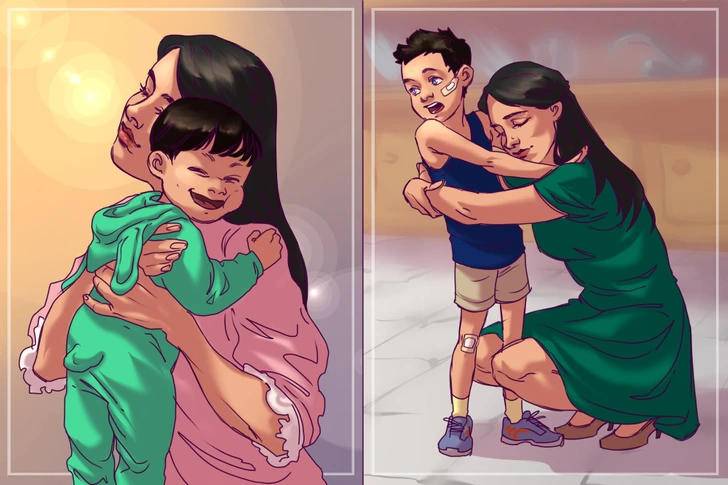9 Outdated and Harmful Beliefs We Still Instill in Our Children
We all want our children to grow up happy, successful, and well-prepared to face the world. But are some of the ideas we hold onto about parenting actually helping? Or are we unintentionally shaping insecure, selfish, and poorly prepared adults? In this article, we’ll explore 9 common parenting beliefs that, far from helping, might be creating obstacles on our children’s path to success. Get ready to rethink—and possibly transform—the way you raise your children.
1. "My Child Deserves the Best of Everything"
Curiosity: What happens when we give without limits?
It seems loving to fulfill all your child's desires, but what if this is fostering selfishness and an inability to handle frustration? Fredric Newman, Director of the Anxiety and Phobia Treatment Center in New York, warns that children raised this way often become demanding adults who expect everything to be handed to them. The problem? In real life, frustration is inevitable, and knowing how to cope with it is crucial.
Practical Example: Instead of satisfying every whim, teach your child the value of effort. Encourage them to save their allowance for something they want. This not only teaches the importance of money but also helps develop patience and discipline.
2. "Always Obey Adults"
Surprise: Blind obedience can be dangerous!
Respect is vital, but when obedience becomes absolute, the risks emerge. Laura Markham, psychologist and author of Peaceful Parent, Happy Kids, explains that children raised to obey without question may become adults who are easily manipulated. The lack of autonomy and initiative can make them vulnerable to abuse and exploitation.
Practical Example: Encourage your child to question, debate ideas, and express their opinions. A simple exercise is to ask them to explain why they disagree with an order, promoting a healthy conversation about the topic.
3. "Straight A’s Are What Matters"
Anticipation: What’s more valuable—grades or experience?
The obsession with high grades might be stifling your child’s emotional and practical development. Psychologist Stephanie O’Leary argues that failure is a vital part of the learning process. Mistakes teach resilience and prepare children for future challenges.
Practical Example: Share stories of successful people who faced failures. Show that the journey is more important than immediate results. This will help your child see challenges as opportunities for growth.
4. "Never Fight or Offend Others"
Authority: Knowing how to defend oneself is crucial!
While teaching not to fight is a value, it’s also essential that children know how to defend themselves. Bullying is a reality, and children who don’t know how to react might suffer in silence.
Practical Example: Teach your child assertiveness, distinguishing between aggression and self-defense. Role-playing conflict scenarios at home can prepare them to respond appropriately in real life.
5. "You Do This, I’ll Handle the Rest"
Emotional Connection: The danger of overprotection.
Taking on responsibilities for your child might seem like a good idea, but it could prevent them from developing essential skills. Children who aren’t allowed to face challenges on their own may grow up dependent and ill-prepared for adult life.
Practical Example: Share household tasks and responsibilities with your children. This teaches organization, responsibility, and the importance of contributing to family well-being.
6. "Go Straight to College After School"
Curiosity: What happens when we rush decisions?
Pressuring your child to go straight to college might lead them to choose careers based on others' expectations, not their own passions. A “gap year” can be a valuable alternative, providing time to mature decisions.
Practical Example: Support your child if they express a desire to take time to explore interests before choosing a career. This break could include travel, internships, or courses that broaden their perspective.
7. "Only a University Degree Matters"
Surprise: Technical careers can be highly rewarding!
While university is essential for certain careers, technical education offers equally valuable paths. Technical professions are often in high demand and offer competitive salaries.
Practical Example: Research and discuss various career opportunities with your child, including those outside of university. Examples of successful professionals in technical careers can inspire them.
8. "Part-Time Jobs Distract from Studies"
Authority: Practical experience is irreplaceable!
Studying is important, but work experience during school years can be a significant advantage. Young people who work learn discipline, time management, and how to handle responsibilities—skills that will be invaluable in the future.
Practical Example: Encourage your child to seek internships or part-time jobs in areas of interest. This experience will provide practical insights into the world and help in career choices.
9. "Let Others Make the Decisions"
Emotional Connection: The danger of not taking initiative.
Children who are taught not to make decisions on their own may grow up dependent and lacking leadership skills. It’s vital that they learn to take initiative and defend their ideas.
Practical Example: Give your child the space to make decisions at home, such as choosing what to eat or what activities to do on the weekend. This will help them develop confidence in their choices.
Conclusion: Transform Your Parenting Today!
Now that you’re aware of the dangers of these beliefs, it’s time to re-evaluate your approach to parenting. Small changes can have a significant impact on raising confident, resilient adults prepared for the challenges of the future. What are you waiting for? Share your experiences in the comments and let’s continue this conversation!


0 Comments